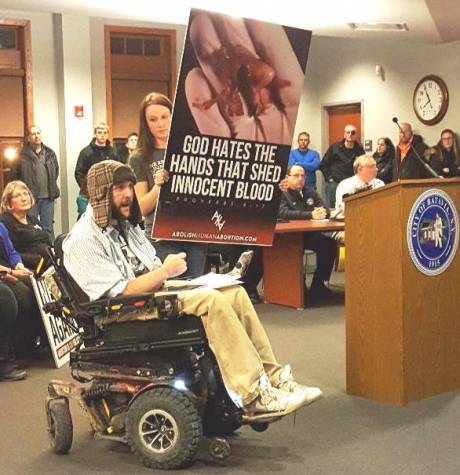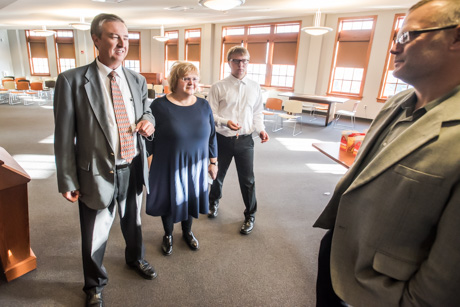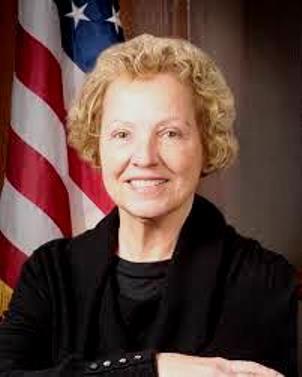GO OUT! event will go on despite objection; City to form anti-crime task force
City Council gave its blessing to a GO OUT! parade and picnic on June 28th in conjunction with Pride Month 2019, challenging the views of a Batavia resident who addressed the board during tonight's (Monday) Business meeting at City Hall Council chambers.
“I request that you deny the license for the permit,” said the Rev. Henry Pokrywa, pastor of Faith Community Chapel on Rose Road. “I don’t feel that public streets should be used to display anyone’s sexuality, whatever that may be.”
Gregory Hallock, executive director of Genesee-Orleans Regional Arts Council (GO ART!) and leader of the GO OUT! group that promotes LGBTQ+ (lesbian, gay, bisexual, transgender, queer/questioning) causes, filed the application for the event, which will run from 6:30 to 10 p.m.
The parade is set to begin at Austin Park and proceed on Washington, Ellicott and Richmond avenues before ending on Bank Street, near the GO ART! building.
Following the parade, activities will take place on Bank Street near Alva Place. A DJ will provide music and there will be games. Alcoholic beverages will be available, but only on GO ART! premises, according to the application.
Hallock thanked City Council for approving the festival and then listened as Pokrywa questioned its validity.
“The gentleman (Hallock) said that this (local Pride movement) has grown,” Pokrywa said, noting that the parade will include floats. “I don’t know the standards, but I’m pretty sure there should be public decency and morality standards. There will be children there.”
Pokrywa said he was “not against anybody” but when it comes to “public morality, we have to decide where we draw that line.”
Lauren Berger, of Mount Morris, a training coordinator for RESTORE sexual assault services, followed Pokrywa to the podium, reporting statistics that indicate an increase in sexual violence and harassment against those who identify as LGBTQ+ and calling for Batavia to assist in getting the word out to help these people.
“Batavia can be the answer to the LGBT desert,” she said.
After that, four Council members spoke in favor of the parade and picnic.
“I don’t want to deny any group,” Rose Mary Christian said. “Thousands of people (enlisted men and women) have died for us to have this freedom.”
Council President Eugene Jankowski said “we know what (gay pride parades) look like, and we’re going to be better than that (and not discriminate),” adding that any violence would be addressed.
“We’re not going to single out people,” Kathleen Briggs said. “We always give our approval.”
And Patti Pacino advised that “you don’t have to be part of the LGBT community to be part of the parade.”
“I will be in the parade, and I’m very straight.”
The GO OUT! event was one of several items discussed by Council, preceding the board’s passage of seven resolutions on the meeting’s agenda.
City Manager Martin Moore reported that, after meeting with Police Chief Shawn Heubusch and department heads, that he is forming a crime task force to tackle the recent spate of violence.
“Our goal is that we don’t want these types of individuals (criminal element from outside the area) in our city and decisive actions will be taken,” Moore said. “The bottom line is that it is unacceptable for our citizens to not feel safe to walk out of their front doors.”
Residents have been on edge in recent weeks as a result of several incidents, including the fatal stabbing of a man outside his home on Ross Street after he went to the aid of a woman who was in a physical altercation with a man.
Moore said that the task force will get started within the next couple and is expected to include leadership from Genesee County, including the district attorney’s office.
“There is going to be a lot of work. We don’t have a committee just to do committees,” he said, adding that he will keep City Council informed throughout the process.
In a related development, Heubusch informed Council members that he is hoping to fill a void in his department by hiring three new police officers by early July.
He said he has a substantial list of candidates who scored well on the Civil Service exam, with an eye of sending the top three – after an extensive interview and background check process – to the police academy in Erie County on Aug. 5.
“Still, even if we hired three officers today, it would be about a year until we could put them on the street,” he said, noting that the academy runs for five months and is followed by four months of field training.
Currently the department lists 33 officers, including the chief and assistant chief.
Moore also reported that a request by Genesee/Orleans Council on Alcoholism and Substance Abuse to provide a social gathering place for recovering addicts at the former North Pole Restaurant at 241-243 S. Swan St. “does not fit within an R-2 (Residential) zone.”
Moore said a letter stating as such was sent to GCASA Executive Director John Bennett, but he has not received a response.
Several Council members (as well as residents in that area) went on record last month against GCASA’s proposal, and Council Member Rose Mary Christian reiterated her opposition tonight, applauding the Code Enforcement office’s conclusion.
Council also heard from North Spruce Street resident Anita Tolejko, who urged the board to do something about motorists who drive the wrong way on the one-way street, primarily from Chase Park to East Main.
She called for a “traffic study, big signs and flashing lights” to put an end to this illegal practice.
“I really don’t know, but I would like something done” (before a head-on collision takes place),” she said.
In other action, Council:
-- Set a public hearing for 7 p.m. June 24 (the date of the next City Council meeting) on a resolution that would relax the residency requirements for new municipal employees per the Batavia Municipal Code.
Jankowski said the amendments focus on expanding the geographical area around the city where new employees may live to include any adjacent town to Genesee County within six months of the date of conclusion of the probationary period for the City. The employee also would be required to live within these areas for the duration of his or her employment.
-- Entered into a contract with a company called three+one, of Pittsford, for cash liquidity and treasury analyses that would lead to increased returns on investments and bank accounts for the City.
The City’s cost to enter the program is $9,900, but that would be returned by three+one if the company fails to find at least $50,000 in additional savings.
The Pittsford firm previously teamed up with the Town of Batavia and Genesee County, with the county reporting significant additional income.
-- Approved agreements with the Batavia City School District that calls for the school to provide transportation of students to the new Teen City site at the former St. Anthony’s School on Liberty Street and to maintain the former City Youth Bureau at 12 MacArthur Drive.
Teen City is partnering with City Church, which owns the Liberty Street property, and the Genesee Area YMCA to offer an after-school youth program. It is expected to begin operation during the week of Aug. 19.
-- Authorized the appointment of City residents Nicholas Harris, Marc Staley and David Leone and Council members Robert Bialkowski and Paul Viele to the Audit Advisory Board.






